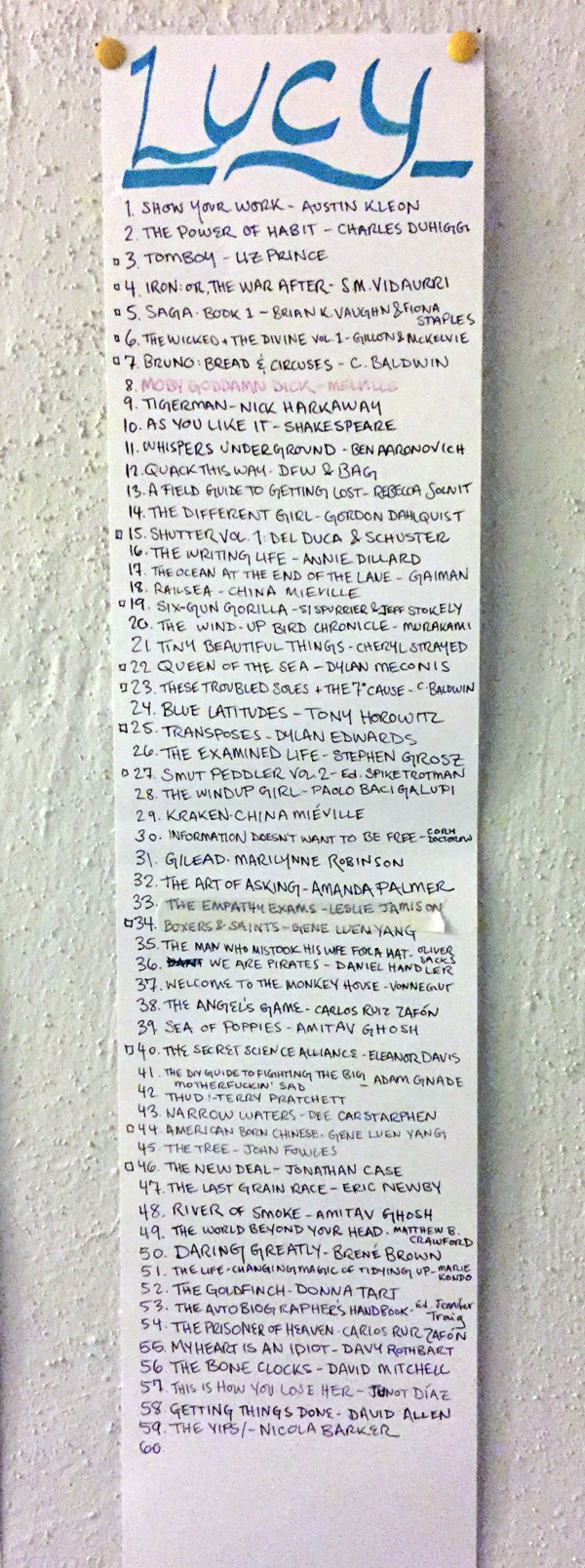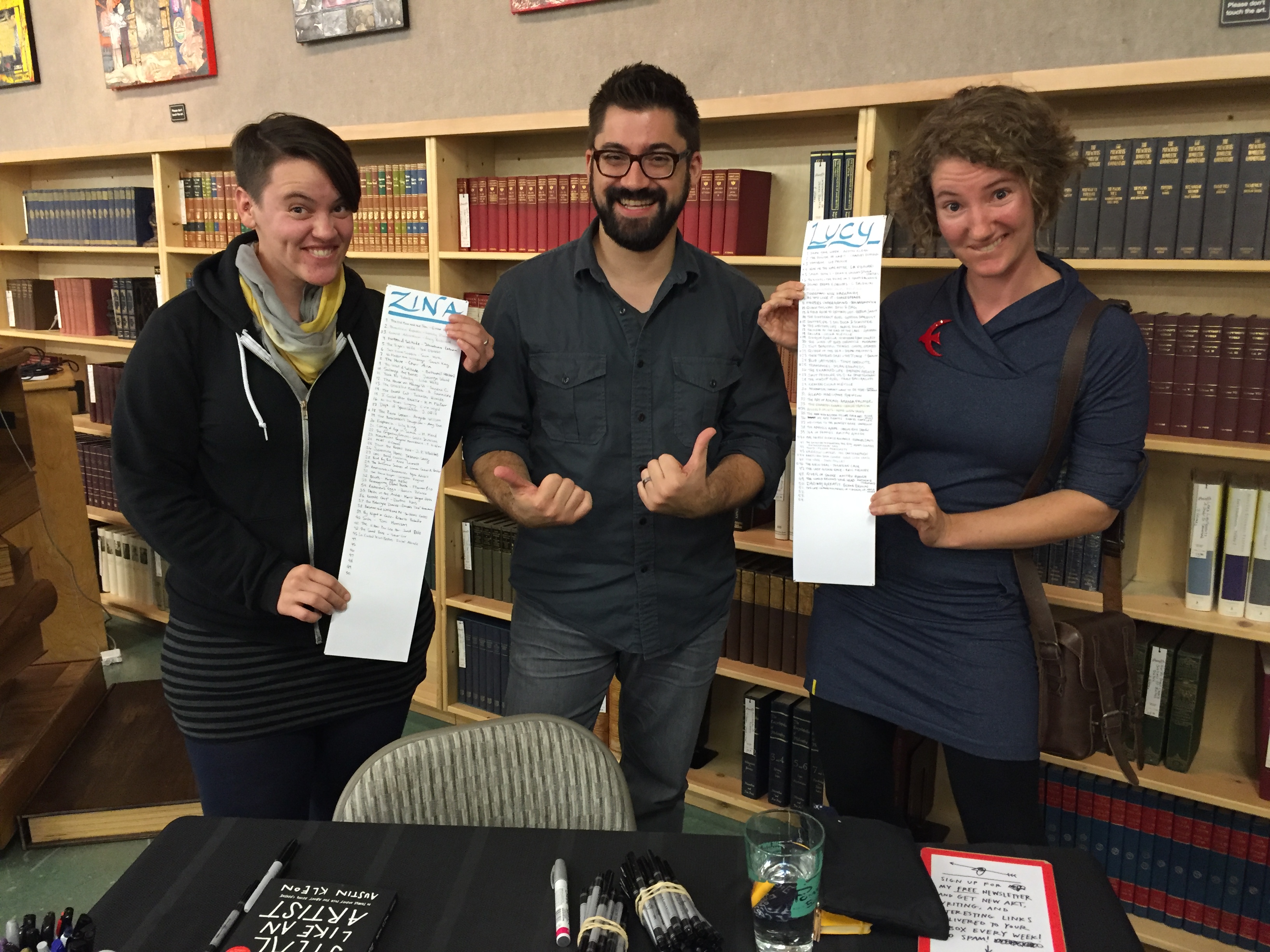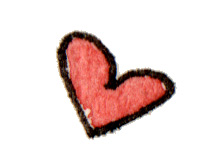Those of you who were here for my last Year in Review post will recall that I didn’t read as much as I would’ve liked to in 2014. So, spurred on by Austin Kleon’s excellent “How to Read More” list, I set out to read…

Good News: I’m currently at 63, and will probably have knocked out a couple more before January 1st officially rolls around, so I’m calling this initiative a roaring success.
I plowed through nonfiction, fiction, comics, memoirs, short stories, plays, and poetry. I tried books randomly off shelves, I tackled stories I’d been meaning to read for years, and I followed up on many recommendations from friends.

My beloved housemate Zina joined me in my quest, and to help ourselves stay accountable we kept long lists outside our bedrooms, marking off titles and making suggestions as we went. This was a really useful way to keep track of everything, notice trends, and direct my choices a little more deliberately.
When Austin came to Portland to promote his new book (the excellent Steal Like an Artist Journal) back in October, we took our lists along to share and grabbed a photo:

It feels great to have stuck with this through the year, and I’m glad to see that my voracious appetite for reading is back in full force.
With that in mind, I thought I’d share a selection of my favorite picks from the past year. I haven’t been taking extensive notes along the way, but these are some impressions to whet your appetite.

I started strong this year by finally going after Moby-Dick [#8], which I can’t believe I’d taken so long to get to. It was dense and lengthy, as I’d been warned, but also immersive, expansive, and utterly engrossing. Melville’s bombastic prose was such a delight that I couldn’t stop myself reading it aloud to anyone in earshot—a book with excellent mouthfeel. Going on the recommendation of my pal Justin Hocking, who knows a thing or two about Moby-Dick, I purchased the Modern Library Classics edition because it also features Rockwell Kent’s stunning woodcut illustrations for the book—a must-have component.
Railsea [18] by China Miéville was part of my broader push to try more Miéville, since he’s been recommended to me maaany times and after reading The City and The City last year I still wasn’t quite convinced. BOY HOWDY DID THIS CHANGE MY MIND. One of the perks of having read Moby-Dick is now twigging to every Moby-Dick reference everywhere, which is no small thing because Western Civ really likes its Giant Whale Book References, but Miéville has really run with it to make something grand here. I loved, in no particular order: the fictitious terminology, the gender parity, the adventure, the imaginative universe, the twists and turns, and all the little tics and nods that brought the reader of both texts into cahoots with the authors.
Basically, for a good time read these two back-to-back.

I’ve been thinking a lot about wandering this year, so it felt apt to pair these two nonfiction titles. Rebecca Solnit’s A Field Guide to Getting Lost [13] and John Fowles’s The Tree [45] were both surprises, in a way. I thought I’d read all of Fowles’s books when I was younger, but this recent re-release of his essay on wilderness and domestication brought my attention to a gap in the canon.
The Tree is a rambling text that explores Fowles’s thoughts on huamnkind’s relationship to nature. The early part of the narrative contrasts Fowles’s affection for untamed spaces with his father’s nigh-Linnaean orchard, but it was the last third of the book that really brought it home for me. The text also highlights the absolute best of Fowles’s prodigious vocabulary (tor, wisht, tachist, clitter, Laocoön, polypodies, bulbul, brassards, fumitory, and lucubration, to name a few—thanks, Jason, for picking these!), while ranging across natural history, personal narrative, and scientific musing.
Solnit, meanwhile, is a writer whose work I’ve seen more and more often on the lists of people I admire, so I chose a collection at random and dove in. A Field Guide to Getting Lost could be in direct conversation with the final section of The Tree, in which Fowles revisits a stunning, desolate patch of woodland in Dartmoor like somewhere from a dream. It echoes throughout this passage from Field Guide:
Lost really has two disparate meanings. Losing things is about the familiar falling away, getting lost is about the unfamiliar appearing. […] you lose a bracelet, a friend, the key. You still know where you are. Everything is familiar except that there is one item less, one missing element. Or you get lost, in which case the world has become larger than your knowledge of it.
Solnit has a mind for nonfiction that I find endlessly fascinating. Her writing is both poetic and critical in the wide-ranging way I love most, and her thoughts on the value of the unknown in the creative process spoke to a lot of what I’d been thinking about this year. I’m looking forward to devouring the rest of her books in 2016. (If you’d like a more extensive taste, there’s a lovely write-up of the collection on Maria Popova’s Brain Pickings.)

I’ll level with you: I was going to buy a self-bettering business book on essentialism during a recent visit to Powell’s and instead I said “Fuck it” on my way out and grabbed The Folly of the World [62] at random off a shelf in the Gold Room because—you guessed it—there was a boat on the cover. I’d never heard of Jesse Bullington, but within three pages I knew this was going to be an unnervingly enjoyable read. The book is foul and visceral and well-researched and vivid and unsettling. It did exactly what I wanted and several things I didn’t anticipate. Curious to pick up more of his stuff.

So now, the Big Ones. The favorites. I read a lot of enjoyable fiction (and nonfiction) this year, but there were some books that were so direct and so human and so brave that I just couldn’t put them down. They stuck with me longer than the rest, and I know they’ve already appeared on many people’s lists, but that’s probably because they’re just splendid, so here they are on mine.
Amanda Palmer’s The Art of Asking [32] was an inevitable must-read because I’m a huge crowdfunding enthusiast and I feel like my entire career has been made possible by the kind of reciprocal relationship Palmer describes in this book. Furthermore, I relate a great deal to her exploration of how we can become comfortable with asking for help from fans or fellow professionals with our work, but remain completely incompetent when asking for help with the more foundational, emotional needs of our lives from the people we love the most.
From what I’ve seen of her writing elsewhere (full disclosure, I didn’t have much prior Amanda Palmer exposure, musical or otherwise) I think the text really benefitted from having an editor or a more coherent publishing structure, because it retains all of Palmer’s trademark vulnerability and irreverence without getting too discursive. Crucial for artists looking to build a familial bond with their audience, equally crucial for humans of any profession looking to build a nurturing bond with one another.

Daring Greatly [50] by Brené Brown was also an obvious choice, because I’ve been on a vulnerability kick and after her smash hit TED talks Brown is pretty much the go-to source on the subject. Daring Greatly was simple, as a read, and less emotionally raw than The Art of Asking, but it still resonated with me a great deal. There’s an element of preaching to the choir, but I still loved quietly saying “yes, Yes, YES” under my breath as I agreed with things on every page. Straightforward, practical, excellent.

Okay. Deep breath. Tiny Beautiful Things [21] is firmly fixed on my Top Books of Forever list right now. It was like a drug. I couldn’t stop myself from reading “just one more column” every time I picked it up, even though each section felt like something to be held and savored and dissolved on the tongue. I hadn’t read any of Cheryl Strayed’s other work—though I have seen her speak on a couple occasions in Portland—so this book came out of nowhere for me. The selection of experiences is so far-reaching, yet familiar in an incredibly intimate way.
If Daring Greatly is a manual for empathy, Tiny Beautiful Things is the truth of it in practice. Watching Strayed begin her answers—all her answers—by validating the experiences of the people who have made themselves vulnerable to her is potent in and of itself. Her association of narratives from her personal life with the stories readers send her way is intimate, insightful, and healing. All of it felt perfect. I recorded chapters and sent them to lovers, I read them aloud to Zina in the bath, I cried over them on the floor of the kitchen, sitting next to the heating vent drinking tea in the morning.
It was only when I followed this up with a theoretically similar book (The Examined Life by Stephen Grosz [26]) that I was struck by how meaningful it is to have the original letters printed alongside Strayed’s answers. Grosz’s accounts as a psychoanalyst (even with personal anecdotes in tow) come off as clinical and removed. He seems to be making pronouncements on anonymized patients, rather than entering into a deeply personal dialogue that somehow becomes universal in the telling. If this experience was anything to go by, I should be reading more advice columns. (Heather Havrilesky’s Ask Polly is my go-to favorite at present.)

So there you have it! Eight favorites from a very busy year. Thanks for reading along, and if you’re game to join me in 2016, why not make your own list? I want to hear all about it.
Hi there! I just wanted to say that I really enjoyed reading your post! To say it is great (not just this post, all of yours!) is an understatement. You are really talented (:
Because of how much I loved this post I had to check out your blog and I couldn’t help but follow you because your blog is both amazing and beautiful! I am so happy I came across your blog and I can’t wait to read more from you, keep it up (:
By the way this comment is towards all of your blog posts because they are all equally amazing and incredible (:
What a wonderful, inspiring project! I used to be a constant reader, and have lately found the internet sucking all my reading time, though I still manage a fair number of books. I think I’ll try this for next year — you’ve just gotten my to-read list started. (…and I love China Miéville’s stuff too — have you read “Kraken”?).
You’re so lucky to have Powell’s there! I always make a point of stopping there whenever I pass through Portland; sometimes even staying the night to make sure to have time. Paradise…
Kraken was the other Miéville book I read this year! Really enjoyed it. Have you looked into Pocket for Internet reading? I’ve been using it as a bookmarking service to keep track of articles I actually WANT to read, so that I can have an easy-to-access library of them the next time I’m stuck somewhere without a book. So far it’s working very well—slick interface, beautiful organization, highly recommended. Thanks for the kind words!
Lucy, I meant to comment on this ages ago, but I super enjoyed this post. I also keep a list of all the books I read (I’ve been doing so since 2004- I made a whole comic about it a few years ago: http://redgoldsparks.tumblr.com/post/121281389315/redgoldsparks-this-month-i-had-a-very-important). I love seeing other people’s book lists. Do you use Goodreads? If you ever make an account we should be friends there 🙂 Your favorable reviews of China Mieville inspired me to pick up “Kraken”, which as been sitting on my shelf for ages. I’m about half way through and really enjoying it. I’ve also been meaning to read “The Bone Clocks” and Ben Aaronovitch’s Rivers of London series. Hopefully I will get to them soon in the new year! If you are looking more books for 2016, “Station Eleven” was possibly my favorite from last fall.